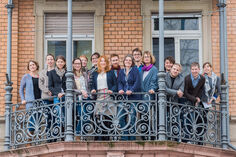"CHIMPS-NET - CHILDREN WITH MENTALLY ILL PARENTS". SUBPROJECT 2: KNOWLEDGE AND SKILLS OF PROFESSIONALS
Project management, consortium partner: Prof. Dr. phil. Svenja Taubner,
Consortium management: Prof. Dr. Silke Wiegand-Grefe
Funding: Innovation Committee at the Federal Joint Committee
Duration: 2019-2021
Background
Children and adolescents with mentally ill parents have a multiple increased risk of developing mental illness themselves. Thus, mental illness is often passed down through several generations. In order to counter this transgenerational transmission and to close the existing gap in psychosocial and, if necessary, psychotherapeutic care for children and adolescents of mentally ill parents, three new cross-sectoral approaches are introduced into care in a stepped care model. The new forms of care include diagnosis of mental illness and, depending on the indication, either prevention or therapy for the children and adolescents and their families. The new forms of care will be evaluated on an ongoing basis and, if successful, will be transitioned into care. In the training "knowledge and skills of professionals", professionals from child and adolescent as well as adult psychiatry are to be sensitized to the special situation and the specific needs of children and adolescents with mentally ill parents and the diagnostic and referral qualities are to be improved.
Training
The training for the professionals was developed on the basis of the mentalization-based approach. The aim is to train the professionals to increasingly adopt a bifocal perspective in order to be able to initiate appropriate therapeutic or preventive interventions for the entire family. This includes teaching theoretical aspects, e.g. on transmission findings, perspectives of parents and children, and basics of mentalization theory. Also the increased adoption of a mentalizing, i.e. a non-knowing, curious and benevolent, attitude, even in difficult situations is the focus of the training. In a further step, the diagnostics for testing the support needs of families and their implementation will be established. These theoretical and practical skills will be imparted to the professionals in a total of two sessions. In the first session, the theoretical basis is created. In the second session, a deeper understanding of the contents is developed with the help of various interactive exercises. The training is offered both online and on-site.
Evaluation
The training will be evaluated with regard to its effects on the identification of parent-patients in the daily routine of the clinic as well as the knowledge, skills and attitude towards family-oriented work of the participants. For this purpose, online surveys will be conducted with the professionals one week before the training and two weeks afterwards.
In addition, the training will be evaluated as one of three measures to promote implementation with regard to its effect on recruitment figures and knowledge, skills and attitudes towards family-oriented work as part of the overarching implementation study by the consortium leadership.



